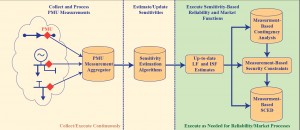SC Converter to Balance a Stack of Four ARM Embedded Computers
PhD student Kai Van Horn with advisors P. Sauer and A. Domínguez-García
The real-time security-constrained economic dispatch (SCED) is a widely used market-scheduling tool that seeks to economically balance electricity system supply and demand and provide locational marginal prices (LMPs) while upholding system reliability standards. The SCED is usually formulated as a convex optimization problem with a piecewise-linear or quadratic objective—typically the minimization of generator costs or the maximization of social surplus. The constraints capture equipment limits and the power balance, network flow capacity limits, and preventative security considerations. They are typically formulated using a linearized power flow model. In this work, we propose a measurement-based approach to the real-time SCED.
Our approach, an overview of which is shown in Figure 30, utilizes power system sensitivities estimated from phasor measurement unit (PMU) measurements to reformulate the model-based power balance and network flow constraints. Furthermore, we utilize the estimated sensitivities in contingency analysis to identify potential contingency-driven equipment overloads and to formulate corresponding security constraints in the SCED. As is shown in our studies on standard power systems test systems, the resulting measurement-based real-time SCED is robust against undetected topology changes, changes in the system operating point, and the existence of incorrect model data. Moreover, the dispatch instructions and LMPs calculated with our proposed measurement-based real-time SCED accurately reflect real-time system conditions and operational reliability needs. This research was supported by Grainger Fellowships.
